Vol. 3 インタビュー サイム・ダービー財団
継続性ある未来の創造・提供――サイム・ダービー財団の揺るぎない理念と信念
Developing and Delivering Sustainable Future――Yayasan Sime Darby’s Unwavering Philosophy and Belief
vol.3 インタビュー サイム・ダービー財団、マレーシア
Interview Column 3: Yayasan Sime Darby, Malaysia
2015年より協議会で実施している「ASEAN諸国における企業メセナの促進とネットワーク構築に向けた調査・協議」(助成:国際交流基金アジアセンター)。本年は、この3年間交流を深めた各ASEAN文化団体へのインタビュー・コラムや、視察レポートを連載しています。
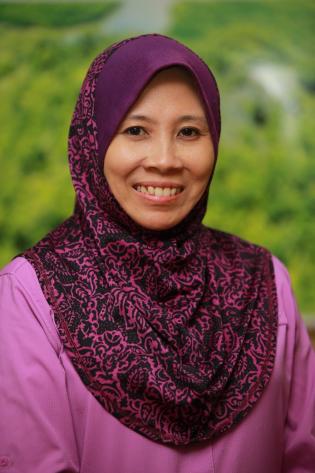
ヤテラ・ザニアル・アビディン(CEO) Hajjah Yatela Zainal Abidin (CEO)
サイム・ダービー財団
マレーシアを拠点に置く多国籍複合企業サイム・ダービー社(造林業、不動産業、工業、エネルギー業など)が運営する財団。支援する活動は、教育や環境、スポーツ、芸術文化などの5部門。すべての支援は「地域の人びとの暮らしへのサスティナブルな影響と変化を創造する」ことを活動指針とし、2012年には慈善活動30周年を迎えた。
Yayasan Sime Darby (Sime Darby Foundation)
100% donated by Sime Darby Group, a multinational corporation with heavy involvement in such as forestry, real estate, manufacturing and energy., Yayasan Sime Darby (YSD) gives their support to activities in the five pillars such as education, environment, community and health, youth and sports, and the arts and culture. The organization celebrated its 30th anniversary in 2012, and all of its activities are based on its philosophy of “creating effects and changes that are sustainable to the lives of community.”
――まず、あなたの組織の哲学は何ですか?
Q: So please tell me the philosophy of your foundation.
ヤテラ:持続可能な未来を創るという目的で作られた財団です。 そして今は、持続可能な未来を提供することを目的としています。私たちの使命は、持続的なインパクトを生み出すことによって他者の人生をより良くすることです。 私たちは、5つの分野を通じて、人々の人生をより豊かなものにし、持続可能な価値を提供することに専念しています。 私たちは高い倫理観を実践し、優れたコーポレートガバナンスを実践しています。 実際に受益者の活動を監査するユニットがあります。私たちにとってはもちろん、私たちの成果物をチェックするだけでなく、人々が関わるプロセスもガバナンスとしてチェックします。道徳的価値とよき企業ガバナンスは私たちのミッションでもあり、私たちは重要視しているのです。
Yatela: Yayasan Sime Darby (YSD) was created for the purpose of developing sustainable futures, that’s the tagline of Sime Darby. And now, it is delivering sustainable futures. The mission is actually, to lead and make a sustainable impact, and a difference in the lives of others. We are dedicated to enhancing lives and delivering sustainable value through our 5 pillars. We practice high ethical values and observe good corporate governance. So, we actually do have a unit here which actually conducts audits on our beneficiaries. We check their deliverables, but also check on the governance of their processes. Ethical values and good corporate governance is a part of our mission, it is valuable to us.
企業におけるCSRと企業財団、それぞれの役割 |Roles of CSR Department and Corporate Foundation
――多くの企業では企業内にCSR(社会貢献)部署が設けられており社会貢献活動を担当していますよね。サイム・ダービーグループという大きな一企業にとって、サイム・ダービー財団を外部につくることは必要なことだったのでしょうか?日本でも企業財団は多々ありますし、サイム・ダービー財団のようにいくつかの分野に特化し支援をしています。また、財団を持たずにCSR部のような部署や、企業文化部のように、企業内で行うことも多々あります。
Q: So I believe lots of corporations who have CSR (Corporate Social Responsibility) Department to deal with this kind of management like what Yayasan Sime Darby does. Was it necessary for the Group to separate that kind of business which Yayasan carries? Many corporations do have their own corporate foundations to particularly invest on a particular fields, in your case 5 pillars. Some corporations would like to carry these kinds of support within CSR department, or a significant and unique department that particularly deals with corporate support for the arts and culture alone.
ヤテラ:サイム・ダービー自体にも社会貢献部は存在します。継続性・持続可能性を扱う部署内に配置されています。しかし、これはあくまでもサイム・ダービー内における社会貢献という内側向けの部です。例えば、組織内の運営として、児童福祉ポリシーであったり、ジェンダーポリシー、従業員の仕事環境を支援したりなど様々です。しかし、財団は、1982年に設立されたのですが、どちらかというと外部向きの社会貢献を目的としています。なぜなら、サイム・ダービー・グループ自体、どのような利益を企業としてあげていようと、その一部を国やマレーシア社会発展のために寄与すべきであるという理念を持っているからです。CSR部はあくまでもサイム・ダービーグループの職員にとっての利益を重視します。反対に私たちの行っているすべては外部へ向いているもので、企業自体とは全く関係がないのです。
Yatela: Sime Darby has its own CSR agenda under its Sustainability Department. But it is focused on internal affairs, it has more to do with assisting operations. So, that would be things like drafting and implementing a Child Protection Policy, Gender Equality Policy and assisting employees in areas where they are having difficulties. But YSD was set up 1982 in order to be outward facing – to implement initiatives that have an impact in society and the nation – because Sime Darby Group believes whatever profits they make, a part of that has to go to the development of the nation and society. These initiatives do not benefit Sime Darby in terms of profit and revenue at all. As much as it aids various vulnerable areas of society, our CSR work also benefits the employees of Sime Darby.
企業とパートナーシップを組み同意のもとプログラムを共同で行うこともあります。たとえば、サバ州にある地域で植樹をするプログラムがあります。5,400ヘクタールという広大な土地なのですが、災害や火事などにあい、樹木が枯れ果てています。しかし、この土地には沢山のオラウータンが住んでいて、彼らは目の前にある川に阻まれてどこにも行けなくなってしまっています。ですから、私たちは、サバ州府と協力し、植樹を始めたのです。しかしながら、財団には土を調査したりできるような知識はありません。もちろん書類等でわかることもありますが、たとえば、その土地にあった木は何か、どのように植えるのがいいのかなどは専門的な見解がいりますよね。その場合、サイム・ダービー・プランテーションと同意書を交わし、パートナーとして彼らの役割を果たしてもらいます。ですから、グループとともに手をとりあって行うプログラムもあります。すべては社会・コミュニティのためを目的にして行っています。
But Sime Darby and YSD may have programmes of mutual interest that may require a mutual partnership. For example, we plant trees in the Northern Ulu Segama Forest Reserve in Sabah, a very big area of about 5,400 hectors of land, highly degraded forest that had been logged many times and there were numerous fires. The area is full of Orangutans, and they cannot go anywhere because there is a river – the Segama River – that bisects the area so the Orangutans are hemmed in to one side of the river. Due to the area’s degradation, the Orangutan population in the Northern Ulu Segama Forest Reserve has been adversely affected. Because of that, we are working with the government to actually plant trees in the area. But we do not have the technical expertise like how do we check, how do we conduct audits on the ground and so on. We can audit documents, but we cannot check whether we are planting the right trees in the right way. So Sime Darby Plantation has this expertise, and we signed an agreement with them to be a partner in the project. They have their roles and we work hand-in-hand with Sime Darby Group, our donors, in this type of projects. But the impact of all the projects that we do are for the society, outside of Sime Darby’s operations.
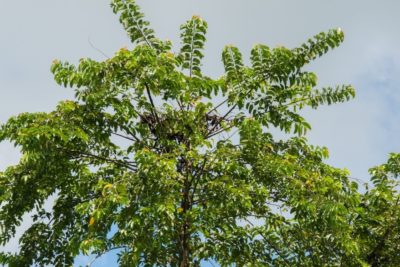
サバ州でサイム・ダービー財団が行っている環境プログラム(上記)-写真はオラウータンの住む木(2008年)
Orangutan nests in trees planted by YSD in 2008 under the reforestation and rehabilitation of Orangutan habitats in Northern Ulu Segama.
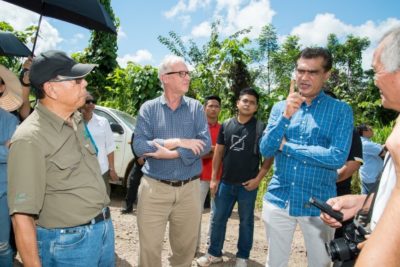
サバ州での環境プログラムの進行状況を確認;左からトゥン・ムサ・ヒタム(サイム・ダービー財団会長)・ジュナイディ・ペイン博士(ボルネオ・リノ連合専務理事)、ダトゥ・サム・マナン(サバ州林政部理事)
Sabah Forestry Department Director Datuk Sam Manan (right) briefs YSD Chairman Tun Musa Hitam (left) and Borneo Rhino Alliance (BORA) Executive Director Dr Junaidi Payne on the progress of YSD’s reforestation project in Ulu Segama.
メーナ:グループが社会貢献に対してとても真面目な態度で取り組んでいます。わざわざ財団をグループの外部につくり、社会貢献のみに集中できるようにしたのです。
Meena: It also shows how serious Sime Darby Group is when it comes to CSR initiatives. In fact, the company has set up the Foundation policies of the company, so the work is very focused and targeted.
ヤテラ:グループ内の誰かが社会貢献活動をしているのではありません。私たちは明確な目的をもった財団です。一企業のようなものです、実際は私たちもグループの子会社ですからね。財団には独立した理事会・カウンシルがあり、財団のガバナンスが100%彼らの手にゆだねられています。ただし、理事は全部で5名いますが、少なくても半数はサイム・ダービーとは全くかかわりのない独立した専門家を入れることにしています。 サイム・ダービー・グループではなく、常に社会に利益をもたらすことを念頭に置いています。
Yatela: It’s not like someone in the group is doing ‘by the way’. It is very much a focused organization. We are a company and we are a subsidiary of Sime Darby Group. We also have our own council, so the governance is independent. In fact, we have to fulfill a requirement that at least a half of members are independent. Now only one of them sits in the Sime Darby Board. YSD has 5 Governing Council members.
財団の予算や組織体 | YSD’s budget and organization structure
――外部の専門家を理事におくことで、様々な観点から見ることができますね。年間の予算となる、資金はどこから得ていますか?グループからでしょうか。
Q: So you bring external experts into the council, to get different perspectives. In terms of annual budget, where do you get it from? Do you receive 100 donation from SDG?
ヤテラ:はい、グループからの100%寄付で動いています。サイム・ダービー・グループは3つの企業に分裂します (http://www.thestar.com.my/business/business-news/2017/07/29/sime-nears-completion-of-demerger/)。今後は3つの企業からの寄付になります。 不動産、プランテーション、その他(物流、産業、モーター)の3つです。
Yatela: Yes, we receive a 100 % donation from Sime Darby Group. As I mentioned, Sime Darby Group is demerging into three entities (http://www.thestar.com.my/business/business-news/2017/07/29/sime-nears-completion-of-demerger/). So after the demerger, we would receive donations from 3 companies – Property, Plantation, and whatever is left of Sime Darby Group (Logistics, Industrial, Motor divisions).
――なるほど。では財団の組織体制は?
Q: Do you have an organization structure?
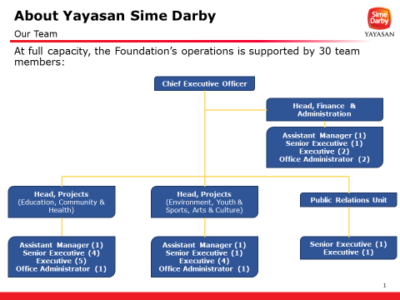
ヤテラ:私の下には財務担当が1名、そして管理部門があります。管理部門はガバナンスを担っています。そして、財務スタッフが財務と会計を担当しています。そして運営部門があります。それから5つの分野の部署があります。5つの分野を管理するために私の下に2つのチームがあります。この3つ(環境、青少年・スポーツ、芸術文化)が1のチーム、他の2つ(地域社会・健康、教育)は1つのチームで運営されています。(左図:サイム・ダービー財団組織図)
Yatela: Yes, so I have a finance team, and we have a controls team. The controls team is in charge of overseeing governance issues. Under the finance team, we have staff in charge of finance and accounting. The controls team has staff that oversees the administration of the Foundation. Then we have project managers in charge of various projects under our five pillars. So, it is structured in a way that there are two heads under me to manage the projects under the five pillars. Three pillars (Environment, Youth& Sports, and Arts & Culture) have one head, and the other two (Community & Health, and Education) is led by one head – her work is much more than the other head.
私たちは教育のプログラムだけでなく、多くの奨学金を払っています。年間300以上の奨学金を授与しているのです。主に恵まれない人々を助けるために。また、英国、中国、インドネシア、パプアニューギニア、アフリカ諸国に留学するためにマレーシア人に奨学金を提供しています。グループがこれらの地域で活動しているからです。その地域の恵まれない人々に、そして貧困層に奨学金を提供しています。私たちの奨学金のもと、マレーシア国立大学でリベリア人とパプア・ニューギニア人が勉強しています。
Under Education, not only do we do education programmes, but we also give out a lot of scholarships. We give out more than 300 scholarships per year, mainly, for underprivileged students to help them. We also give scholarships to Malaysians to pursue tertiary education in the United Kingdom, China as well as Indonesia, and Papua New Guinea, and African countries. Because Sime Darby Group operates in these areas, we hand out scholarships to the underprivileged students in these countries.
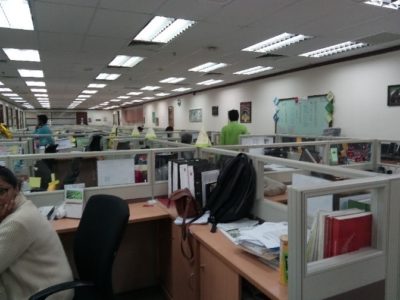
奨学金部門では、チームを率いる部長の(ムズダリファ・モハメド・ナシル)の下に副マネージャーがいます。彼女は教育プロジェクトや地域社会や健康プロジェクトも総括しています。その下に2つの柱があり、プロジェクトにはアシスタントマネージャーがいます。2人のアシスタントマネージャーは、奨学金と、もう1つは教育プログラムを担っています。
The head of the Education and Community & Health pillars (Muzdalifah Mohd Nasir) has an assistant manager to head a team under her to oversee the Scholarship programmes. She also has another assistant manager to oversee the Education projects. She oversees the Community & Health projects as well. So, there are two pillars under her, and projects are overseen by assistant managers. So under the Education pillar, there are two assistant managers to help her. One is for Scholarships and the other is Educational programmes.
コミュニティと健康の部門では、恵まれない人々を助けています。昨日、私のチームは非常に貧しい貧しい学校に行きました。子供たちは食べるものがありません。マレーシアでは、貧困の社会があり、実際に子供たちに食べ物を与えるのに十分な資金がありません。私たちが毎日やっていることではありませんが、ラマダンの期間は非常に特別です。これは贈り物や慈善団体の期間であり、私たちは外出して何も食べることができない人々を見つけ出し、可能な限り食べ物を提供します。そのため私のチームはこの学校に行って、これらの子供たちと家族に、食べ物を提供しました。健康の部門では多くのがん研究を行います。また、恵まれない人々が心臓手術を受けることを支援します。その他。財団には30の職位があります。
The Community & Health pillar is focused on assisting the underprivileged as well. Yesterday, my team went into a very poor school, where the kids do not have anything to eat. In Malaysia, there are societies where people are starving and they don’t have enough money to actually give their kids food. So, the month of Ramadhan is very special for most of us because most of us are Muslims in Malaysia. This is the month of giving and charity, so we go out and find those who are too poor to afford food supplies and give out food as much as we can. Yesterday, my team went to this school, gave food to these kids and their families. As for Health, we support Cancer Research Malaysia which does a lot of cancer research. And we also assist the underprivileged who are unable to afford heart operations. In total, we have 30 positions in YSD to take care of our work.
――とてもしっかりと構成されているのですね。
Q: It is well-managed.
ヤテラ:はい。ですが、このような組織体制になったのは2010年1月1日からです。私がCEOに就任したときです。それ以前は人事が奨学金制度を担当し、グループ・コミュニケーション&企業総務が残りの4つの分野を担当していました。しかし、組織改造が財団のなかで起こり、5つの分野すべてを財団が担当することになったのです。理事もすべて変わり、理事会も運営チームが事業に専念できるようにと望んだのです。なので、この財団を今現在のように組織化するように私が呼ばれました。様々な困難はありましたが。
Yatela: We have actually implemented this structure only on 1st January 2010. That was when I was appointed as CEO. Previously, the work carried out by the Foundation was done by the Group’s Human Resource Department, which oversaw scholarships, while Group Communication and Corporate Affairs oversaw the work under four other pillars. But, because there was a restructure of YSD, they enlarged the scope of the CSR agenda to five pillars and they changed the council members. It was the council members who wanted a dedicated operational team for the Foundation. So that is why I was brought in actually to set up this organization and when I came in, there were a lot of hiccups!
助成事業におけるポリシー-より多くのプロジェクトへ助成を届ける | Policy- funding for a diverse range of programs to make a bigger impact
――日本の企業財団は独立していることもありますが、ここまで組織化しているのはまれだと思います。サイム・ダービー財団はグループからも独立していますよね。独自の体制や運営方法がありますね。日本では、企業の社員が出向している場合もあります。それに支援分野に特化した専門家ではない職員などもいるので、どのような支援が効果的かなどはあまりわかってないこともあります。日本では、芸術の中でも支援する分野にかなり差があるように思えます。例えば、企業メセナ協議会が行っている「2016年度メセナ活動実態調査」では37%が音楽、28%が美術、そして10%ほどが祭りや伝統芸能です。他の分野は、たとえば、ダンス、文学などはあまり見られません。
Q: Many Japanese corporations also have their own foundations, but quite difference I would say. Your organization is very independent from Sime Darby Group. You have own way of operating, on the other hand, some corporate foundations are monitored and operated directly by the management of corporation. In Japan, it seems that the areas of their support in terms of genre of arts are quite narrow. For example, statistic shows that 37% for music, 28% for visual arts, 10% for traditional matsuri which presents Japanese culture. Performing Arts and Literature, for example, are rare cases.
ヤテラ:なるほど。私たちの組織にはポリシーがあります。それは一人につきひとつまでしかサポートしないということです。なるべく多くのプロジェクトに資金を助成するためです。例えば、1団体が1つのプロジェクトに対し助成を受けます。そのプロジェクトが終わり、また違うプロジェクトを申請することはできます。その場合、同じ申請手順を踏まなくてはいけません。しかしながら、1度に2つ以上のプロジェクトに助成することは決してありません。これは理事会からも強く言われているポリシーです。より大きな影響を与えるために、より多くのコースを提供するべく私たちは予算を節約しています。
Yatela: I see. For us, we have a policy which underlines that if we are supporting one person so many times, and that person comes to us with another programme, we cannot support it. The money needs to go to another programme, another organization or person. But if this person finishes one project, then he/she can apply for another project, going through the same application process and approvals. But we cannot support one organization or one person with multiple projects at the same time. That is a policy that my council is very strict about. We have reserved our offers to give out to a diverse range of programmes to make a bigger impact.
――少量だが皆に届くということですよね。
Q: Small amount but reachable to everyone.
ヤテラ:はい。スポンサーシップの申請方法は、ウェブサイトから申請するだけです。一般に公開されていて、とても簡単です。記入方法のガイドもあります。実際に申請プロジェクトを評価するには、多くの情報が本当に必要になるため、フォームの項目は長いです。我々はそれらのすべてを検討したいとおもっています。私たちは1ヶ月に100回の応募を受けているため、チームには多くの人がいます。
Yetala: Yes. How people can apply for our sponsorships is they just have to apply from our website. Its open for public. We have pages to fill in but on the website. Yes, if you go to our website, there is a place to submit your forms. It is very easy. There is a guide of how to fill up the form. But it is a long form. Because we really need a lot of information to actually assess it. We want to consider all of them. Because we get 100 application a month. We have many people in my team.
――サポートしている5つの分野は、どのように選択したのでしょうか?
Q: So you have five pillars you are supporting, how were they chosen?
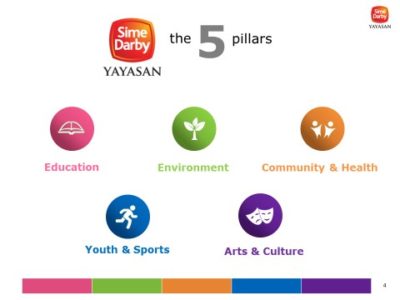
ヤテラ:私が来る前に行われたことで、世界中のさまざまな慈善団体の研究をした理事の一人が決めたことです。マレーシアを考えて、5つの分野を選びました。この5つの分野は、社会を支援する上で最も重要です。ですから、私たちはこの5つの分野の配分を決めました。教育は40%、地域社会と健康は20%、マレーシアで重要な環境は20%、若者やスポーツでは10%、芸術や文化では10%です。教育が非常に重視されていることがわかります。1982年の開始当初は奨学金制度のみでしたが、2009年
になって初めて、この5つの分野が設定されました。
Yatela: That was done before I came in, it was set by one of our council members who did a lot of research on various charity organisations around the world. And with that, they chose these five pillars based on what is needed in Malaysia, so these five areas are most important for assisting Malaysian society. We have set allocations for these five pillars, which is 40% for Education, 20% for Community & Health, 20% for Environment, 10 % for Youth & Sports, and 10% for Arts & Culture. So, you can see we are very much focused on Education. When we started in 1982, we only gave out scholarships and nothing else. It was only in 2009 that the other four pillars were set up.
助成団体との関係性づくり| Relationship between beneficiaries
――たとえば、ASKダンスカンパニー(ASK Dance Company: 2016年8月のクアラルンプール視察にてパフォーマンスを披露してくれたダンスカンパニー)をサポートしていますが、サポートの期間は定められているのでしょうか?
Q: So for instance, you support the ASK Dance Company, do you have a set of period for supporting them?
ヤテラ:現在、彼らのサポートを年単位で行っています。最初の提案は1年間で、次の提案、は2年間でした。私たちは、彼らが目標を達成するために本当に必要がないと感じるところは減額しています。
Yatela: For now, the support for them is on an annual basis. Actually at the beginning when they came to us, we supported them for two years, and the first proposal was for one year. Then, for the next proposal, they came to us for support for two years. When they submit their proposal to us, we go through and cut down where we feel they don’t really need that much of funds to achieve their objectives.
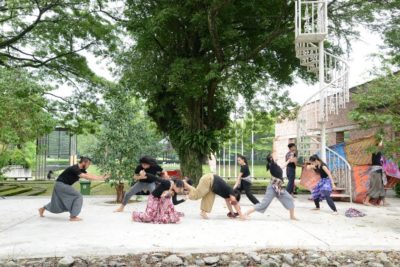
ASKダンスカンパニー (2017年のサイム・ダービー財団主催環境デーでの公演) The ASK Dance Company performing at YSD Environment Day 2017
――では、ある特定の人や団体にたいして特別処置をするということもないわけですね。
Q: So it is not exclusive?
ヤテラ:そうです。どの申請者も同じプロセスを踏まなくてはいけません。私たちもすべての申請にたいし平等に精査します。理事会にあげるものもそうです。特別に扱うことは決してありません。
Yatela: No, every single beneficiary goes through the same process. And we do the same process and assessments, same recommendation to the council. Nobody is special.
ただ私たちは家族のように彼らを捉えています。なぜかというとガバナンスの面も重要だからです。どのプロジェクトもきちんと目的を達成しKPIをクリアするようにするのが私たちの役目なのです。ですから、次年度推薦する前にきちんと調査をします。毎年、理事会にて承認を得なくてはいけません。しかし、私たちは2011年から彼らを支援しているのですもちろん、信頼関係もありますし仲も良いです。ダンサーたちの名前も、生活もよく理解しています。
Yatela: For us, ADC is like a family. We do it this way because of our governance policy. We have to ensure every single project that they do, they have clear deliverables and Key Performance Indices (KPIs), which we assess before the recommendation to the council for the next year. For every single year, I will need to present the projects to the council for approval, and if the council doesn’t approve it, they don’t get the support. But because we have been supporting them from 2011, we are like a family for 6 years already. Of course we are very close, I know their names, their lives, and they are very close to us.
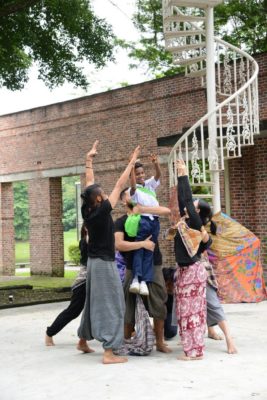
ASKダンスカンパニー (2017年のサイム・ダービー財団主催環境デーでの公演) The ASK Dance Company performing at YSD Environment Day 2017.
メーナ:それにいくつかのプロジェクトは受益者たちとの関係性のもとにその成果を図ることも大切なのです。
Meena: It is important to build a relationship with our beneficiaries to ensure they constantly communicate with us about their KPIs and objectives, so that we can assist them where it is needed.
ヤテラ:両者間のコミュニケーションですね。私たちの支援を長い間受けているプロジェクトは沢山あります。なぜなら、支援期間を延長しているからです。もしKPIがクリアされれば、理事会に期間を延長するように推薦します。それは、もちろん彼らのゴール・目的がまだ達成されていない場合にです。この支援制度が始まってから支援し続けているプロジェクトは多々あります。
Yatela: It is a two-way communication. We have a lot of projects that have been with us for a long term. This is because we have been extending support when they achieve KPIs and we usually recommend to the council to extend the support, if what they want to do is not yet finished. So there are lots of projects that we are supporting for a long time since we started.
――とても良いアイディアですね。
Q: I think this is a good idea.
ヤテラ:受益者とどのような関係を築いているのかいくつか例を紹介しますね。例えば、ASKダンスカンパニーですが、彼らは支援を2011年から受けています。私たちはかれらの可能性を信じているのです。彼らも助成に頼らず運営できると考えています。しかし、彼らはダンサーです、ビジネスのセンスは持ち合わせていません。ガバナンスなどわからないのです。ですから、経済的な支援だけではなく、ビジネス的なトレーニングを提供します。自分たちで実際に収益をあげ継続可能にしていく、そしていつかは運営費や経費よりも収益をあげることができるようにすることがこのプログラムの社会貢献なのです。
Yatela: I can give you some examples how our relationship with our beneficiary assists them. We have a few kinds of relationship/support that we give. For example, for ADC, they have been supported by us from 2011, but we know they have so much potential to be sustainable on their own. So, because they are professional dancers, they do not have a business sense, they do not understand governance. So aside from CSR and providing them with money, we also provide them technical knowledge, we give them training on financial management and governance. So, they can actually earn enough money to sustain themselves, and one day, to earn more so that they can sustain themselves as well as their CSR projects which we are currently supporting.
――確かに、100%助成金に頼るのではなく、年月を経て50%助成、50%自己資金で、そして10年後には100%自己資金ですべて運営していけるようにもっていくのは重要ですね。財団がガイダンスし、彼らをそのように導き育成しているのですね。
Q: So instead of relying on 100% of external funds, they can, over time, rely on 50% of external funds and 50% of self-funding and in 10 years’ time, they will be 100% self-funded. You are guiding them to make sure they can head that way rather than depending on you always.
ヤテラ:そうです。「持続可能」が大切なのです。将来この財団はないかもしれません。未来は誰にもわからないのです。ですから、私たち抜きでもきちんと持続していけるような支援を提供しています。
Yatela: Yes! Sustainability is very important. We might not be here in the future. We do not know what will happen in the future. Without us, they should be able to sustain themselves, so that’s one kind of support we give.
もうひとつ例をあげます。クアラルンプール舞台芸術センターです。理事会の決定では毎年少しずつ助成額を減らしていくというものでした。理由のひとつに彼等自身で持続可能にしていってほしいというのもありました。しかし、彼らが得ている収入ではとても足りません。他からの支援も必要としています。私たちがしたことのひとつが電気代のディスカウントです。私たちの会長が電気会社の社長にかけあってくれ、センターの電気代を減額してもらうことに成功しました。これだけでもかなりの負担を減らすことになります。センターにおいて一番の問題が高額の電気代だったからです。それから、彼らにも私たちが助成金を減らしていっているのがわかっていましたから、自分たちで様々な支援の働きかけを外部にするようになったのです。クラウドファンディングのように一般市民からも支援を募るようになりました。ただ経済支援をするのではありません。助成金をあげてさようならではないのです。私たちは家族です。受益者を私たちは家族といつもよんでいます。
For KLPAC, the council instructions to us was to cut the funding cost little by little, also for them to be more sustainable on their own. What they earn is actually not enough, they still require external support. So what we did was to help them to get some discount on their electricity bill. Our chairman talked to the chairperson of the electricity company, Tenaga Nasional Bhd, and asked them to give KLPAC some discount. Electricity costs are the main costs of KLPAC. So they gave a huge discount which took a big chunk of financial woes off their chest. So we also help our beneficiaries out in that way. Also, because they see us reducing our support, they have now improved their own crowd-sourcing, crowd-funding sources by taking initiatives to get admissions from the public. We don’t only give money, we don’t only get involved by giving out grants and say bye. We are a family. We always call our partners family.
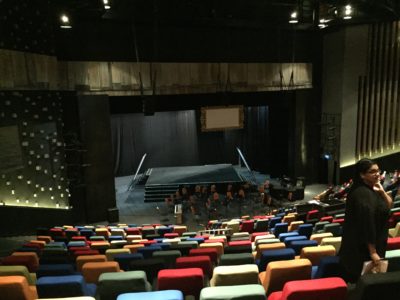
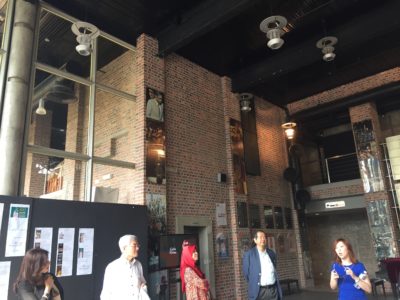
130~140年前に建てられたマレーシア南部の国有鉄道ターミナル駅を改装して作られたクアラルンプール芸術劇場 Old national rail station became one of the most active performing arts hub
――ヤテラさんはCEOにも関わらずとても親身になってくれます。多くのCEOはそんなこともないですし、コミュニティと接したりなどないでしょう。
Q: It is also your personality. Normally CEOs are not like that, they don’t even come out that much.
ヤテラ:そのようなCEOには財団などを運営することはできないと思います。社会のため、コミュニティのため、彼らのために働くのが努めです。それに、プロジェクトが成功すると満足感・幸せを感じます。お金ではなく、そういった人間的道徳的な部分が大切ですね。
Yatela: I don’t think a CEO like that will strive in a charity foundation because you need to feel for the society, and do work for the society. Also, you get a sense of fulfillment when things are successful, you feel happy. It is not only about the money, other things are also important.
サイムダービー財団アーツ・フェスティバル |Yayasan Sime Darby Arts Festival
――同感です。では次の質問に行きましょう。サイム・ダービー財団のアーツ・フェスティバルについて聞かせてください。どのように始まったのでしょうか?
Q: I agree. So in terms of Yayasan Sime Darby Arts Festival, how did it start?
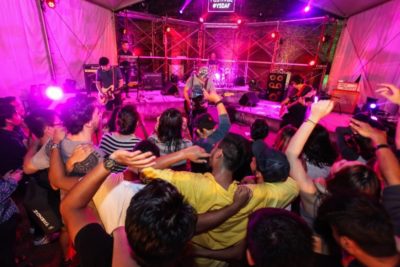
2016年度のフェスティバル・バンド公演 Crowd going wild a band’s performance at YSDAF 2016
ヤテラ:会長のアイディアです。この財団はマレーシアでも特に大きな芸術支援団体です。もちろん、5つの分野のひとつでしかないのですが。芸術支援に関してナショナル・アワードを受賞したことは人々も知っています。会長はフェスティバルをすることで私たちの、芸術分野における3つの目的を達成することができると考えたのです。1つは‘認識’2つ目は‘促進・振興’、そして3つ目は‘要求の増加’です。フェスティバルはこの全部が含まれています。たとえば、過去数年のフェスティバルは2日間のカーニバルでした。イベントや公演が一日中開催され最終日はフィナーレとなります。フィナーレには15000名もの観客が集まりました。その半数以上は芸術に触れたことのない人々でした。彼らにとって芸術はエリートや金持ちのもの、高すぎるもの、そして理解できないものでした。そのようなこともあって、私たちは家族向けのイベントや子供向けのワークショップなど幅広く展開しました。一つ一つにそれぞれテーマがあります。教育的なイベントも数多くあります。このフェスティバルは芸術の新しい「認識」を生み、アーティストに様々な催し物を行ってもらうように「促し」、そしてまた人々が見たい参加したくなるように「要求」を作り上げたのです。このフェスティバルにおいてすべての目的が達成できるので実施ています。
Yatela: It was the idea of the YSD Chairman. We are actually one of the biggest funders of the arts in Malaysia, although it is just one of our pillars, we won a national award and people know about us because of our work in the arts. So the chairman thought that it would be good to do a festival, because one of the segments in the arts is awareness as well as to encourage the arts and create the demand. Do we want a festival like this, focusing on all of our segments with one initiative? In the last couple of the 2-day festivals, we have events and performances throughout the days before the finale. A total of 15,000 people attended the finale and more than half of them are those who have never experienced the arts. They think the arts are for elites, too expensive, about things they don’t understand. So we created the arts for families, so they can all come. We also had workshops for children. Every event has a theme and the last one was Education. Your president, Mr. Ozaki, also attended several workshops last year. The event touched on awareness and encouraging the arts, because so many artists are doing their activities, as well as on creating demand for the arts. So, with our arts festival, we can achieve all our objectives, and that’s why we have it.
11.jpg2016年度フェスティバルにて(ドラムセッション) Crowd at YSDAF 2016 participating in a drum performance.
今後の展望―より大きなインパクトを目指すために |For the future – More impact to the society
――財団の今後の展望はどのようなものでしょうか?
Q: True. So what is your future scope?
ヤテラ:変わらないと思います。5つの分野に焦点を当て続けまたもっと沢山のプロジェクトを支援しもっと大きなインパクトを生み出すことです。この産業に長く関われば関わるほど、私たちも賢くなります。どのようにして少ない経済支援でより大きなインパクトを生み出せるのか。私たちがもっと賢くなれば、5つの分野における私たちのインパクトはさらに大きくなります。
Yatela: We are going to be the same, focusing on five pillars but we want to help even more causes to make a bigger impact. Because the longer we are in this industry, we are getting more clever, how to spend less money to make a much bigger impact. So because we are getting clever in doing things, I think our impact would be much more in these five pillars.
――サイム・ダービーからくる寄付は年々減ってきているのですか?
Q: A question popped into my head, is your donation from Sime Darby Group getting less?
ヤテラ:経済不況のせいで数年前に寄付を半分に減らされました。しかし、今は少しずつ増えてきています。今はその寄付である程度成果のある事業ができていると思います。
Yatela: Well, because of the economic slowdown, our donations were actually halved a couple years ago.
But now that it’s increased a little, we can actually do substantial works with what they are donating to us.
――企業では、やはり収益と関係し寄付なども変わると思うのですが。
Q: For corporations, it occasionally has to do with their profits.
ヤテラ:グループのトップが私たち財団のやっている事業を高く評価してくれているのです。私たちが社会に与えるインパクトや社会創造事業をとても認めてくれています。それに彼は理事会のメンバーの一人でもあります。彼の努力のおかげで、グループが分裂してしまっても、この財団は変わらずにいられたのです。少なくとも今後5年は。それぞれのグループの利益は財団に寄与することになっています。もしグループの総務や運営側に任せていたら、このような決定には至らなかったと思います。これは、グループ内でも上位にいる決議権をもっている彼が言ったことだからこそ、このような結果になったのです。前も言いましたがCEOによるのです。CEOはとても重要なのです。それから、私たちはパートナーも探しています。プロジェクトを一緒に支援してくれる企業や財団なども探しています。
Yatela: The difference for us is that the person sitting high up sees the value in all the work we do, and the impact that we are making in the society. He is one of our council members as well. He works very hard to ensure, even with the demerger, that Yayasan Sime Darby still remains, at least, for the next 5 years. With respect to profits, the three companies will still have to give donations to Yayasan Sime Darby. If you leave it up to the operation team or the people to make decisions, this kind of position will not have been made. This is because someone at the very high up who can make all decisions, made that decision. As I said, it depends on the CEO. The CEO is very important. We also look forward to partners in funding, if we have projects that we are supporting, maybe another partner can come in as well, and they can fund the projects together with us.
――今日はとても貴重なお話ありがとうございました。
Q: Thank you so much for today!
ヤテラ:どうもありがとうございました。
Yatela: Thank you very much.
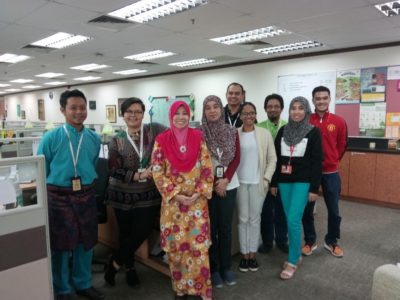
左から:ハフィズディン・アリフ(プロジェクト・アシスタントマネージャー)、エリカ・チュング(シニア・エグゼクティブ)、ヤテラ・ザニアル・アビディン(CEO)、アズリナ・アワン(アドミニストレーター)、サイク・ガサン(プロジェクト・エグゼクティブ)、メーナ・ラクシャ(広報)、フィクリ・ノル(経理・運営エグゼクティブ)、ヌルル・シャクリン(経理・管理エグゼクティブ)、アズアン・ムハンマド(プロジェクト・エグゼクティブ)
(Left to right) YSD Projects assistant manager Muhammad Hafizuddin Mohd Arif, YSD Projects senior executive Erica Choong, YSD CEO Puan Hajjah Yatela Zainal Abidin, YSD Office Administrator Nor Azlina Awang, YSD Projects executive Saiful Islam Shaik Mohd Hassan, YSD Public Relations senior executive Meena Lakshana, YSD Finance and Administration executive Mohd Fikri Md Nor, YSD Finance and Controls executive Nurul Shakirin Zulkefli, YSD Projects executive Mohammad Azuan Mohammad Azlan.
インタビュー6月16日
Interview held on 16 June 2017
